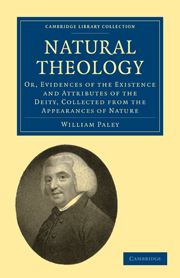 Natural Theology
Natural Theology Book contents
- Frontmatter
- Contents
- CHAP. I STATE OF THE ARGUMENT
- CHAP. II STATE OF THE ARGUMENT CONTINUED
- CHAP. III APPLICATION OF THE ARGUMENT
- CHAP. IV OF THE SUCCESSION OF PLANTS AND ANIMALS
- CHAP. V APPLICATION OF THE ARGUMENT CONTINUED
- CHAP. VI THE ARGUMENT CUMULATIVE
- CHAP. VII OF THE MECHANICAL AND IMMECHANICAL FUNCTIONS OF ANIMALS AND VEGETABLES
- CHAP. VIII OF MECHANICAL ARRANGEME'NT IN THE HUMAN FRAME—OF THE BONES
- CHAP. IX OF THE MUSCLES
- CHAP. X OF THE VESSELS OF ANIMAL BODIES
- CHAP. XI OF THE ANIMAL STRUCTURE REGARDED AS A MASS
- CHAP. XII COMPARATIVE ANATOMY
- CHAP. XIII PECULIAR ORGANIZATIONS
- CHAP. XIV PROSPECTIVE CONTRIVANCES
- CHAP. XV RELATIONS
- CHAP. XVI COMPENSATIONS
- CHAP. XVII THE RELATION OF ANIMATED BODIES TO INANIMATE NATURE
- CHAP. XVIII INSTINCTS
- CHAP. XIX OF INSECTS
- CHAP. XX OF PLANTS
- CHAP. XXI OF THE ELEMENTS
- CHAP. XXII ASTRONOMY
- CHAP. XXIII PERSONALITY OF THE DEITY
- CHAP. XXIV OF THE NATURAL ATTRIBUTES OF THE DEITY
- CHAP. XXV OF THE UNITY OF THE DEITY
- CHAP. XXVI THE GOODNESS OF THE DEITY
- CHAP. XXVII CONCLUSION
CHAP. XII - COMPARATIVE ANATOMY
Published online by Cambridge University Press: 07 September 2010
- Frontmatter
- Contents
- CHAP. I STATE OF THE ARGUMENT
- CHAP. II STATE OF THE ARGUMENT CONTINUED
- CHAP. III APPLICATION OF THE ARGUMENT
- CHAP. IV OF THE SUCCESSION OF PLANTS AND ANIMALS
- CHAP. V APPLICATION OF THE ARGUMENT CONTINUED
- CHAP. VI THE ARGUMENT CUMULATIVE
- CHAP. VII OF THE MECHANICAL AND IMMECHANICAL FUNCTIONS OF ANIMALS AND VEGETABLES
- CHAP. VIII OF MECHANICAL ARRANGEME'NT IN THE HUMAN FRAME—OF THE BONES
- CHAP. IX OF THE MUSCLES
- CHAP. X OF THE VESSELS OF ANIMAL BODIES
- CHAP. XI OF THE ANIMAL STRUCTURE REGARDED AS A MASS
- CHAP. XII COMPARATIVE ANATOMY
- CHAP. XIII PECULIAR ORGANIZATIONS
- CHAP. XIV PROSPECTIVE CONTRIVANCES
- CHAP. XV RELATIONS
- CHAP. XVI COMPENSATIONS
- CHAP. XVII THE RELATION OF ANIMATED BODIES TO INANIMATE NATURE
- CHAP. XVIII INSTINCTS
- CHAP. XIX OF INSECTS
- CHAP. XX OF PLANTS
- CHAP. XXI OF THE ELEMENTS
- CHAP. XXII ASTRONOMY
- CHAP. XXIII PERSONALITY OF THE DEITY
- CHAP. XXIV OF THE NATURAL ATTRIBUTES OF THE DEITY
- CHAP. XXV OF THE UNITY OF THE DEITY
- CHAP. XXVI THE GOODNESS OF THE DEITY
- CHAP. XXVII CONCLUSION
Summary
Whenever we find a general plan purfues, yet with fuch variations in it, as are, in each cafe, required by the particular exigency of the fubject to which it is applied, we poffefs, in fuch plan and fuch adaptation, the ftrongeft evidence, that can be afforded, of intelligence and defign; and evidence, which the moft completely excludes every other hypothefis. If the general plan proceeded from any fixed neceffity in the nature of things, how could it accommodate itfelf to the various wants and ufes which it had to ferve, under different circumftances, and on different occafions? Arkwright's mill was invented for the fpinning of cotton. We fee it employed for the fpinning of wool, flax, and hemp, with fuch modifications of the original principle, fuch variety in the fame plan, as the texture of thofe different materials rendered neceffary. Of the machine's being put together with defign, if it were poffible to doubt, whilft we faw it only under one mode, and in one form; when we came to obferve it in its different applications, with fuch changes of ftructure, fuch additions, and fupplements, as the fpecial and particular ufe in each cafe demanded, we could not refufe any longer our affent to the propofition, “that intelligence, properly and ftrictly fo called, (including under that name, forefight, confideration, reference to utility,) had been employed, as well in the primitive plan, as in the feveral changes and accommodations which it is made to undergo.”
- Type
- Chapter
- Information
- Natural TheologyOr, Evidences of the Existence and Attributes of the Deity, Collected from the Appearances of Nature, pp. 227 - 258Publisher: Cambridge University PressPrint publication year: 2009First published in: 1803


